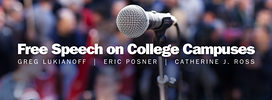Lukianoff’s latest post throws a lot more First Amendment law at me. But as I’ve explained several times now (with no response), his argument fails if he relies on First Amendment law because First Amendment law protects speech codes at private universities. FIRE itself recognizes this point; that’s why it lets off the hook any university that “clearly and consistently states that it holds a certain set of values above a commitment to freedom of speech.” FIRE acknowledges what it grudgingly calls the “freedom of association” of private universities. The more accurate term is their freedom of speech—the same right that other private corporate bodies enjoy. But whatever you call it, we’re talking about First Amendment values that Lukianoff thinks should be subordinated to his vision of speech code–free private universities.
Understood charitably, Lukianoff’s argument is that private universities should abolish speech codes, whatever the law permits them to do; and that we should be pleased that courts have denied similar First Amendment protections to public universities. This is a policy argument, not a legal argument. Since I have disputed this basic point from the start, Lukianoff’s legal arguments—which consume all but one paragraph of his post—are irrelevant.
As for that paragraph, I quote it in full:
Posner seems to accept as a certainty that students from different backgrounds need to be protected from one another, seizing upon the potential for hurt feelings and awkward misunderstandings while ignoring the parallel opportunities for dialogue and growth. By imposing speech codes and seeking to avoid offense at all costs, rather than recognizing the real—if sometimes difficult—value in having one’s core beliefs challenged, colleges teach students that offense is the worst possible outcome. That misguided impulse drives some of the problems Jonathan Haidt and I also discussed in our Atlantic piece last fall.
I said no such thing! Another one of my neglected arguments was that applying the rigid First Amendment template to private universities, as Lukianoff wants to do, would prevent them from experimenting. If I were “certain” about anything, then my aim—which is to let them try out different approaches to speech—would make no sense. My view, based on epistemic humility (the value that Lukianoff claims that he shares with me), is that because we do not know what the optimal speech regulation is for private universities, we should let the market in higher education decide.
But my real complaint with this paragraph is that it displays a narrow, unrecognizable vision of the university—the vision of a free-speech advocate, not someone who shows much understanding of the university’s mission and activities. Colleges don’t teach students that “offense is the worst possible outcome.” Students who attend halfway decent universities do get their core beliefs challenged—in class. Anyone who takes a few courses in history, philosophy, science, or literature will learn that most of their cherished beliefs have been rejected by the greatest minds and most of humanity. Compared to this, the campus speech code issues that preoccupy FIRE are small beans.
I have also pointed out that he needs to reconcile this position with his justified worry that students suppress speech by intimidating other students. Censorship by students is a more significant problem than censorship by the universities (as John Stuart Mill would have predicted). Lukianoff offers no remedy. Shouldn’t universities take action to reverse this lamentable trend, I asked? No answer; no explanation.

